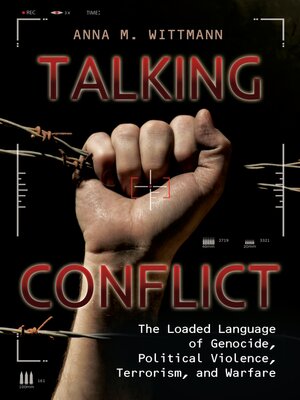Talking Conflict
ebook ∣ The Loaded Language of Genocide, Political Violence, Terrorism, and Warfare
By Anna M. Wittmann

Sign up to save your library
With an OverDrive account, you can save your favorite libraries for at-a-glance information about availability. Find out more about OverDrive accounts.
Find this title in Libby, the library reading app by OverDrive.



Search for a digital library with this title
Title found at these libraries:
| Library Name | Distance |
|---|---|
| Loading... |
In today's information era, the use of specific words and language can serve as powerful tools that incite violence—or sanitize and conceal the ugliness of war. This book examines the complex, "twisted" language of conflict.
Why is the term "collateral damage" used when military strikes kill civilians? What is a "catastrophic success"? What is the difference between a privileged and unprivileged enemy belligerent? How does deterrence differ from detente? What does "hybrid warfare" mean, and how is it different from "asymmetric warfare"? How is shell shock different from battle fatigue and PTSD? These are only a few of the questions that Talking Conflict: The Loaded Language of Genocide, Political Violence, Terrorism, and Warfare answers in its exploration of euphemisms, "warspeak," "doublespeak," and propagandistic terms.
This handbook of alphabetically listed entries is prefaced by an introductory overview that provides background information about how language is used to obfuscate or minimize descriptions of armed conflict or genocide and presents examples of the major rhetorical devices used in this subject matter. The book focuses on the "loaded" language of conflict, with many of the entries demonstrating the function of given terms as euphemisms, propaganda, or circumlocutions. Each entry is accompanied by a list of cross references and "Further Reading" suggestions that point readers to pertinent sources for further research. This book is ideal for students—especially those studying political science, international relations, and genocide—as well as general readers.
Why is the term "collateral damage" used when military strikes kill civilians? What is a "catastrophic success"? What is the difference between a privileged and unprivileged enemy belligerent? How does deterrence differ from detente? What does "hybrid warfare" mean, and how is it different from "asymmetric warfare"? How is shell shock different from battle fatigue and PTSD? These are only a few of the questions that Talking Conflict: The Loaded Language of Genocide, Political Violence, Terrorism, and Warfare answers in its exploration of euphemisms, "warspeak," "doublespeak," and propagandistic terms.
This handbook of alphabetically listed entries is prefaced by an introductory overview that provides background information about how language is used to obfuscate or minimize descriptions of armed conflict or genocide and presents examples of the major rhetorical devices used in this subject matter. The book focuses on the "loaded" language of conflict, with many of the entries demonstrating the function of given terms as euphemisms, propaganda, or circumlocutions. Each entry is accompanied by a list of cross references and "Further Reading" suggestions that point readers to pertinent sources for further research. This book is ideal for students—especially those studying political science, international relations, and genocide—as well as general readers.







